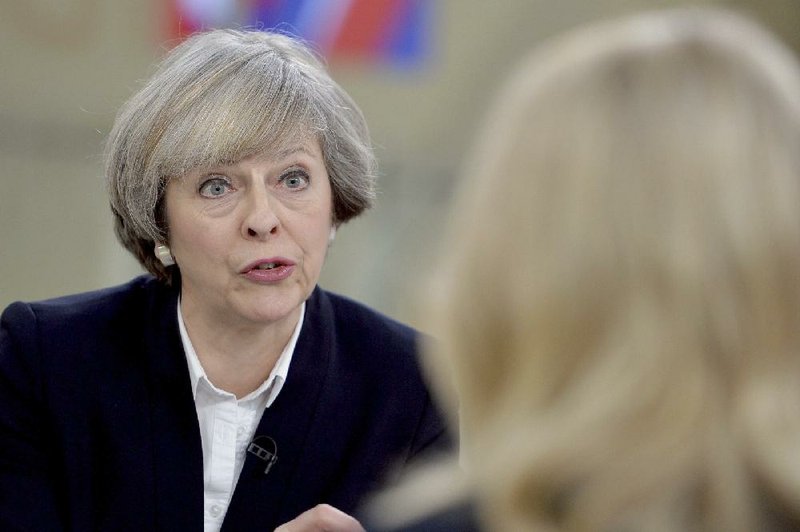LONDON -- Britain's leaders on Sunday signaled their resolve to play hardball in talks with the European Union, suggesting they will look for partners elsewhere if the bloc restricts access to its huge market.
Under pressure to reveal her exit blueprint, British Prime Minister Theresa May's office said she will call for a "truly global Britain" that is more open to the world when she sets out plans for negotiations with the EU in a speech later this week. Treasury chief Philip Hammond told the German newspaper Welt am Sonntag that Britain is prepared to "do whatever we have to do," including turning away from Europe to other markets, to protect its economy.
"If Great Britain left the European Union without an agreement on market access, then we could at least in the short term suffer economic damage," Hammond was quoted as saying. "In this case, we could be forced to change our economic model."
Hammond also suggested that Britain could cut taxes to encourage companies to move to the U.K.
Labor leader Jeremy Corbyn, meanwhile, suggested that May was prepared to trigger a full-scale "trade war" to get her way.
The comments come amid a standoff over migration into Britain. While Britain wants to curtail immigration from Europe, the EU says the U.K. must abide by rules guaranteeing the free movement of people if it wants to retain tariff-free access to the bloc's market of more than 500 million people.
British media interpreted the statements as a further sign that May is prepared to leave the EU without any form of privileged relationship, an option often described as "hard Brexit." Similar comments last week caused the pound currency to tumble to its lowest level against the dollar since October on concerns about damage to the British economy.
"May calls for clean hard Brexit," declared the Sunday Times. "May's big gamble on a clean Brexit," The Sunday Telegraph said.
Writing in the Sunday Times, David Davis, the British secretary of state for exiting the EU, underscored the government's position by saying Britain would "respect the views of the British people" and demand control over immigration.
"We will bring back control over our laws and make our own decisions on immigration, we will aim to maintain cooperation on security as it is now, if not enhance it, and we will seek the most open possible market with the EU while furthering trade links with the rest of the world," he wrote.
May has said for months that she will invoke Article 50 of the EU's key treaty, formally beginning the process of negotiating Britain's departure, by March 31.
But she has refused to reveal details about Britain's goals or its negotiating strategy, arguing that to do so would weaken Britain's hand. That lack of clarity has fueled allegations that her Conservative government's plans are in disarray.
But Europe may also be feeling the heat. In testimony to lawmakers last week, Bank of England Governor Mark Carney said that Britain's exit poses a greater threat to financial stability in Europe than in the U.K.
Any disruption in Britain's sprawling financial services sector could restrict the flow of capital to European businesses that rely on U.K.-based institutions for big-money transactions.
"I am not saying there are not financial stability risks in the U.K. And there are economic risks to the U.K. But there are greater short-term risks on the continent in the transition than there are in the U.K.," Carney said.
Information for this article was contributed by Geir Moulson of The Associated Press.
A Section on 01/16/2017

